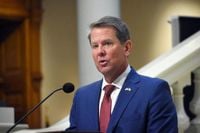Georgia’s political landscape is heating up as Governor Brian Kemp has officially announced that he will not run for the U.S. Senate in 2026, a decision that has set off a competitive scramble among Republican hopefuls eager to challenge incumbent Democratic Senator Jon Ossoff. This announcement comes as a surprise to many, as Kemp, a two-term governor, was seen as a strong candidate who could effectively compete against Ossoff.
On May 5, 2025, Kemp stated that pursuing the Senate seat was "not the right decision for me and my family." Political analysts suggest that his choice was influenced more by personal considerations than political ambitions. Bill Crane, a longtime Georgia political strategist, emphasized that Kemp's family dynamics played a significant role in his decision. With three daughters and a desire to remain close to home, Kemp’s inclination towards the executive model of governance also contributed to his choice.
The absence of Kemp from the race opens the door for a host of Republican candidates, many of whom are already positioning themselves for the upcoming battle against Ossoff. Among the most notable contenders is U.S. Representative Marjorie Taylor Greene, who has expressed interest in running and is known for her polarizing presence in the GOP. Greene's potential candidacy raises eyebrows, as she could energize the party’s base, but also risks alienating moderate voters.
Other Republicans eyeing the race include former U.S. Senator Kelly Loeffler, who previously faced Ossoff in a runoff election, and Congressman Buddy Carter, who officially became the first Republican to enter the race on May 8, 2025. Carter, who has a long history in Georgia politics, released a video ad claiming, "President Donald Trump has a warrior in Buddy Carter," while attacking Ossoff’s record.
In addition to Carter and Greene, several other prominent figures are considering their options. These include Congressman Mike Collins, Congressman Rich McCormick, Georgia Secretary of State Brad Raffensperger, and state Insurance Commissioner John King. Each of these candidates brings unique strengths to the table, with varying degrees of name recognition and political experience.
The Republican primary is expected to be fiercely contested, with as many as ten candidates potentially vying for the nomination. Crane noted that the bruised nominee emerging from this primary could be politically damaged and struggle to mount a robust challenge against Ossoff, who has been preparing for a competitive campaign.
Ossoff, who launched his reelection campaign in March 2025, has been vocal about his intention to run a strong campaign, asserting that he is "well prepared to defeat any challenger." Despite being considered vulnerable given Georgia’s shifting political landscape, Ossoff has built a reputation for effective constituent services and bipartisan outreach, which may serve him well in the upcoming election.
Political dynamics in Georgia have evolved significantly since the 2020 elections, where Ossoff and Raphael Warnock narrowly flipped the state’s Senate seats to Democrats. The twin Senate races cost more than $900 million combined, highlighting the financial stakes involved in Georgia politics. Warnock’s reelection campaign in 2022 alone exceeded $470 million, underscoring the high cost of competitive races in the state.
As the Republican field continues to take shape, candidates will need to navigate the complexities of Georgia’s electorate, which has shown a willingness to shift allegiances in recent years. The presence of Trump’s influence looms large, as candidates like Greene and Collins align themselves closely with the former president’s agenda.
Looking ahead, the 2026 Senate race is shaping up to be one of the most closely watched contests in the country, with both parties keenly aware of the implications for control of the Senate. With Kemp out of the running, the GOP must now rally behind a candidate who can unite the party and appeal to a broader base of voters.
As the political landscape continues to evolve, the stakes are high for both parties. The outcome of the 2026 Senate race will not only determine Georgia’s representation in Washington but could also influence the broader national political landscape as the country heads into the next election cycle.




